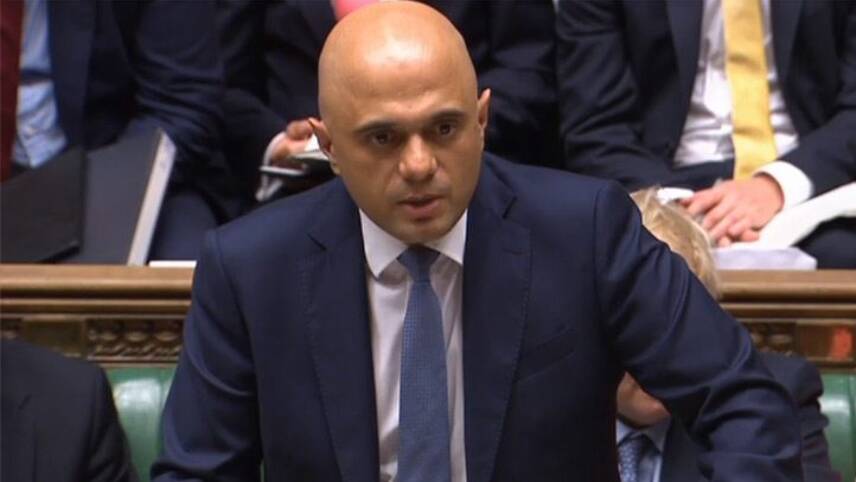Register for free and continue reading
Join our growing army of changemakers and get unlimited access to our premium content

Image: Parliament Live
Speaking this afternoon (4 September) to deliver his first Spending Round announcements since taking up the post, Javid unveiled plans for an additional £30m to be funnelled into infrastructure decarbonisation schemes over the next 12 months.
Exact information regarding how this funding will be split, Javid said, will be confirmed in the upcoming National Infrastructure Strategy, due out in autumn.
“We can now afford to turn the page on austerity and move forward from a decade of recovery to a decade of renewal,” Javid said.
“The sustainability of our public factors depends on wider factors, not just the cost of borrowing; our population growing, the global economy slowing and the challenge of decarbonisation [are]real.
“The first priority of our new economic plan will be to rebuild national infrastructure. High-quality and reliable infrastructure is essential to how we live, work and travel; but the truth is that, over the past decades, governments of all colours have under-invested in infrastructure.”
Also included in today’s spending review were a £30m funding increase for measures to tackle air pollution in towns and cities; a £200m pot aimed at “transforming” bus services to lower carbon emissions and implement new technologies; and a £30m coffer for terrestrial and marine biodiversity measures.
The latter of these investments will be used to deliver a major global review into the economic value of biodiversity, including the financial risks of its decline and rewards of its stewardship, as outlined by Javid’s predecessor Philip Hammond, as well as maintaining and restoring UK-based habitats.
Brexit and beyond
Away from domestic green spending, Javid used the Spending Round to announce an extra £87m for the Department for International Development (DFID), aimed at helping developing nations supported by UK funding to reduce their reliance on high-carbon energy and adapt to climate change impacts.
The move comes after recent research commissioned by the Catholic development agency CAFOD and produced by the Overseas Development Institute revealed that the UK has spent 60% of its overseas support for energy investment in developing countries on fossil fuels over the past seven years.
In May, then-International Development Secretary Rory Stewart revealed plans to double the amount of foreign aid spent on climate-related projects to over the next five years. Stewart said he would like the £1.1bn sum that DFID t the Department for International Development (DFID) spends on climate mitigation and adaptation projects overseas annually to rise to £2.2bn by 2024.
Also in funding for sustainable international projects and relations, Javid committed £432m to deliver a “safe and ambitious departure from the European Union (EU), while setting global standards in protecting and harnessing value from the natural environment”.
This figure includes £20m to support the delivery of a replacement for the UK’s existing Common Agricultural Policy in England, including the upcoming Agriculture Bill.
However, this announcement comes amid reports that Boris Johnson is seeking to break away from EU environmental standards after Brexit – regardless of whether this weakens existing provisions.
In total, Javid’s announcements in this Spending Round total £13.8bn.
Green economy reaction
Reacting to the Spending Round in its entirety, Friends of the Earth’s head of policy Mike Childs said that the measures “undermine” the Government’s green credentials – specifically, its 2050 net-zero target and frameworks around biodiversity.
“Measures to cut climate-wrecking pollution, boost nature and clean up our filthy air have been starved of investment for far too long – they need far more than the few financial crumbs offered by the Chancellor today,” Childs said.
“Today’s announcement falls a long way short of the £42bn needed every year to tackle the planetary emergency.”
WWF UK’s chief executive Tanya Steele agreed, saying that Javid’s measures fall “woefully short” of what is needed to meet net-zero before mid-century.
“Our forests are burning and our ice caps are melting – we desperately need government action that matches the scale of what we are facing,” Steele added.
“We can choose a future of climate catastrophe or we can be ambitious and imagine a different, more sustainable future for the UK. But failing to act now is the mother of all false economies.”
I am very disappointed that in the wake of raised green ambitions that only 30 million of the new #SpendingReview billions is for global biodiversity. @NaturalEngland we will do our best with slender resources, but we cannot do what is needed without increased investment. pic.twitter.com/N6HKnazrUG
— Tony Juniper (@TonyJuniper) September 4, 2019
The Institute for Public Policy Research’s (IPPR) associate director Luke Murphy, who also acts as the head of the organisation’s environmental justice commission, voiced similar concerns.
“The government might have world-leading targets on climate change but this statement didn’t deliver the resources required to meet them – this was a drop in our warming and increasingly acidified oceans,” Murphy said,
“This spending review could have prioritised spending on a retrofit programme to deliver warm homes, investment in clean public transport or funds to protect and restore nature – instead the Chancellor announced far more money for a reckless and damaging no-deal Brexit.
“Today is a huge missed opportunity and one that will have lasting implications for this and future generations.”
“Any Chancellor fit for office would have announced a Green New Deal as an economic cure for the triple crisis of inequality, climate breakdown and failed finance,” Green MP Caroline Lucas added.
“This spending review doubles down on a failed economic model that is trashing our environment and trashing the prospects for young people.”
Sarah George


Please login or Register to leave a comment.